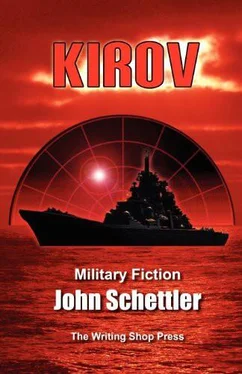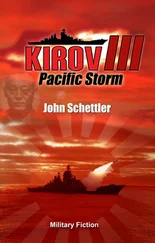John Schettler - Kirov
Здесь есть возможность читать онлайн «John Schettler - Kirov» весь текст электронной книги совершенно бесплатно (целиком полную версию без сокращений). В некоторых случаях можно слушать аудио, скачать через торрент в формате fb2 и присутствует краткое содержание. Жанр: Фантастика и фэнтези, Альтернативная история, на английском языке. Описание произведения, (предисловие) а так же отзывы посетителей доступны на портале библиотеки ЛибКат.
- Название:Kirov
- Автор:
- Жанр:
- Год:неизвестен
- ISBN:нет данных
- Рейтинг книги:5 / 5. Голосов: 1
-
Избранное:Добавить в избранное
- Отзывы:
-
Ваша оценка:
- 100
- 1
- 2
- 3
- 4
- 5
Kirov: краткое содержание, описание и аннотация
Предлагаем к чтению аннотацию, описание, краткое содержание или предисловие (зависит от того, что написал сам автор книги «Kirov»). Если вы не нашли необходимую информацию о книге — напишите в комментариях, мы постараемся отыскать её.
Kirov — читать онлайн бесплатно полную книгу (весь текст) целиком
Ниже представлен текст книги, разбитый по страницам. Система сохранения места последней прочитанной страницы, позволяет с удобством читать онлайн бесплатно книгу «Kirov», без необходимости каждый раз заново искать на чём Вы остановились. Поставьте закладку, и сможете в любой момент перейти на страницу, на которой закончили чтение.
Интервал:
Закладка:
Volsky shook these sad thoughts from his mind, glad at least that Kirov was here beneath him in spite of these difficulties. It took all the nation’s technical resources, and the cannibalization of several older vessels, to build the ship the Admiral was standing upon now. As for Orel, he thought, that old submarine should have been mothballed years ago. The day of the Oscar had come and was long since gone. Construction had been halted on the last three in her class, and there would be no further development.
The same could be said for the submarine’s crew, he thought. Mounting the wrong ordnance was sheer stupidity. Such a misstep would be unthinkable in time of crisis, which was exactly what this exercise was supposed to be simulating. It spoke of gross incompetence, disorderly procedures, and poor leadership. He had seen all too much of that in his time in the navy, and was tireless in trying to root it out. If he had been aboard that boat, he would have the Captain in a pot for soup. But instead it was the Admiral who was stewing, shifting restlessly in his chair, his eyes ever on the barometer at the far wall of the bridge citadel, dark flashing glances that spoke volumes. Leonid Volsky was worried about something.
For two days now he had been bothered with an ache in a tooth that always seemed to signal bad weather. Now the sallow grey skies, rising winds, and slowly surging seas also spoke the same to him. He could ask Rodenko about it, his able radar man, but he would learn nothing more than he already knew. The Arctic seas were vast and fickle, dangerous and temperamental. They could lull you with a sea of glass under a thick icy fog one minute, and then blow with a force nine gale the next. The current situation had all the hallmarks of big storm brewing on the horizon. Rodenko would tell him the front was 60 miles out and moving at 30 knots, leaving him plenty of time to complete this exercise and batten down for rougher seas, but the smell of the air, that dull, empty, icy cold Arctic air, told him everything he needed to know. He could sense the storm, taste it, feel it as the pressure slowly dropped. His ears would ring, his eyes begin to water from the chill, his sinuses dry and irritated.
And the Admiral was irritated as well. It was something more that was bothering him now, a vague unrest, a veiled inner thrum of anxiety, an off sense of foreboding that he could not quite localize in his mind. Yes, he had good reason to worry now with tensions on the rise and war games in the offing again. The frost of a new cold war was blowing in like that distant threatening weather front. Yet this was something more. He could feel the unease in his bridge crew as well, sense their quiet apprehension. Karpov was, of course, the worst of the lot. The Captain was pacing, his hands clasped behind his back, his face hard beneath the thick wool fringed Ushanka that he always wore when on duty.
Then, like a pot that had finally reached its boiling point, the Admiral launched himself into a long, unhappy discourse.
“What does Rudnikov have to say now?” Volsky said to his radioman Nikolin. “Tell them we are fifteen minutes behind schedule. In that much time an American task force could have twenty Tomahawk cruise missiles bearing down on us, or worse. We would have lost the element of surprise, completely mishandled our approach to the target, and we would most likely be sitting at the bottom of the sea to contemplate the error of our ways. The man who fails to think ahead of time will have a very long time to think afterwards when his fat, ugly boat is berthed up in Murmansk with all the rest, waiting to be broken up for scrap and hauled away by the salvage teams. Perhaps then he will have learned the value of proper timing in a naval exercise.”
Members of the bridge crew smiled to themselves as they listened, accustomed to the Admiral's long diatribe on most any subject that did not meet with his approval. To them he was old “Papa Volsky,” Grand Admiral, Godfather, King of the Northern Seas. And they were his well favored and trusted retainers, many of them hand-picked and promoted up through the ranks by this very man. He was a shining example of naval professionalism, a consummate strategist, strict disciplinarian, yet an amiable father to a crew he regarded as his own private family. His strength, willpower, decisiveness, and quiet dignity had been an example to them all for years now, even as his wrath would be their bane. Just the sight of him, sitting thoughtfully in his command seat, his hand toying with the wood of his pipe, was a comfort to them. His deep set eyes would flash beneath graying brows when he spoke, his voice a strong baritone suited to his ample frame.
They would do anything for him, go anywhere with him, and he returned their loyalty with the generosity that sometimes seemed out of place on a naval warship where Spartan asceticism was the rule the day. Yet no one was surprised when a box of fine Cuban cigars would turn up in the wardroom, a gift from the Admiral to all his ranking officers and chiefs.
On the other hand, like the sea around him, he could be temperamental at times, quick to anger one moment, stoic and quiet at other times when a brooding inner vision seem to haunt him, a quiet darkness that hid within his soul in a place no man could sit with him for tea. At such times he expressed his frustrations in these long monologues, lecturing, as any father would do with wayward sons. He was firm in handling any perceived breach of procedure, but never cruel or heartless. When he criticized, he could drain the blood from a man's face in ten seconds. Yet when he praised a man, you could see the lucky soul swell right there before him. It was not mere bluster and the bludgeon of authority that gave the man his rank. His mere presence radiated command, from the cut of his uniform, to the tilt of his cap, Leonid Volsky was an admiral in every sense of the word.
Volsky crossed his arms and pursed his lips, clearly bothered by the delay. This was supposed to be a simple live fire exercise, a routine that had been practiced many times before, yet now it seemed to auger something dark and foreboding. He had a strange feeling that there was something amiss, something slightly off its kilter. It was not merely the impending onset of bad weather, or the frustrating incompetence of Rudnikov on the Orel. There was something more… He could not see what it was just yet, but some inner voice warned him that this day would be far from routine. Call it intuition, or the barnacled salt of many years experience at sea, but Volsky sensed something was wrong. He found himself listening intently to the ship, the sound of its turbines, the hum of the electronic consoles here on the main bridge, as if he might ferret out the vague disquiet that had settled over him. Yet everything sounded normal to his well tuned ear.
The ship he sailed was the newest addition to the fleet, a miraculous resurrection of one of the most imposing classes of surface combat vessels ever designed. Any sailor worth his salt will tell you that it's bad luck to rename a ship, but the Russians never seemed to bother with it. Most ships in the Kirov class had started with the name of the Russian city, and then been renamed after a famous admiral or general. In Kirov’s case, the ship also bore the name of the revolutionary hero Sergey Kirov. Sure enough, one by one, each ship seemed to suffer some peculiar fate, an accident, a mishap at sea, then a seemingly endless berthing at a lonesome port awaiting a promised overhaul that never came. Kirov had suffered more than others. First launched in the 1980s, the ship bedeviled Western naval planners for decades. She was renamed Admiral Ushakov much later in her history, but had long since been retired after an accident with her nuclear reactor made the vessel unserviceable.
Читать дальшеИнтервал:
Закладка:
Похожие книги на «Kirov»
Представляем Вашему вниманию похожие книги на «Kirov» списком для выбора. Мы отобрали схожую по названию и смыслу литературу в надежде предоставить читателям больше вариантов отыскать новые, интересные, ещё непрочитанные произведения.
Обсуждение, отзывы о книге «Kirov» и просто собственные мнения читателей. Оставьте ваши комментарии, напишите, что Вы думаете о произведении, его смысле или главных героях. Укажите что конкретно понравилось, а что нет, и почему Вы так считаете.












